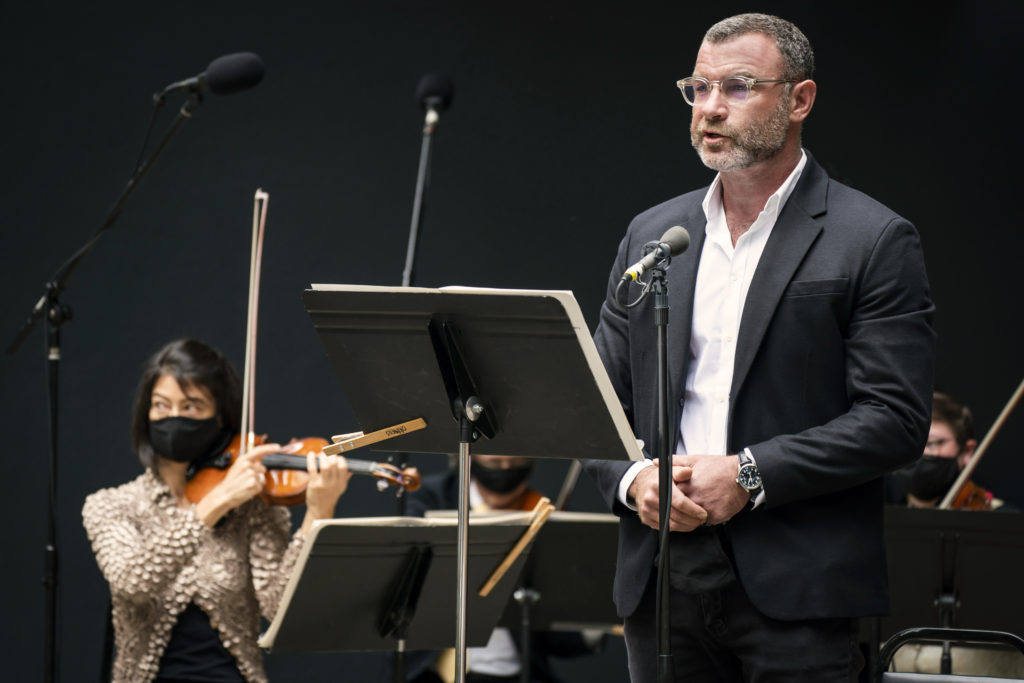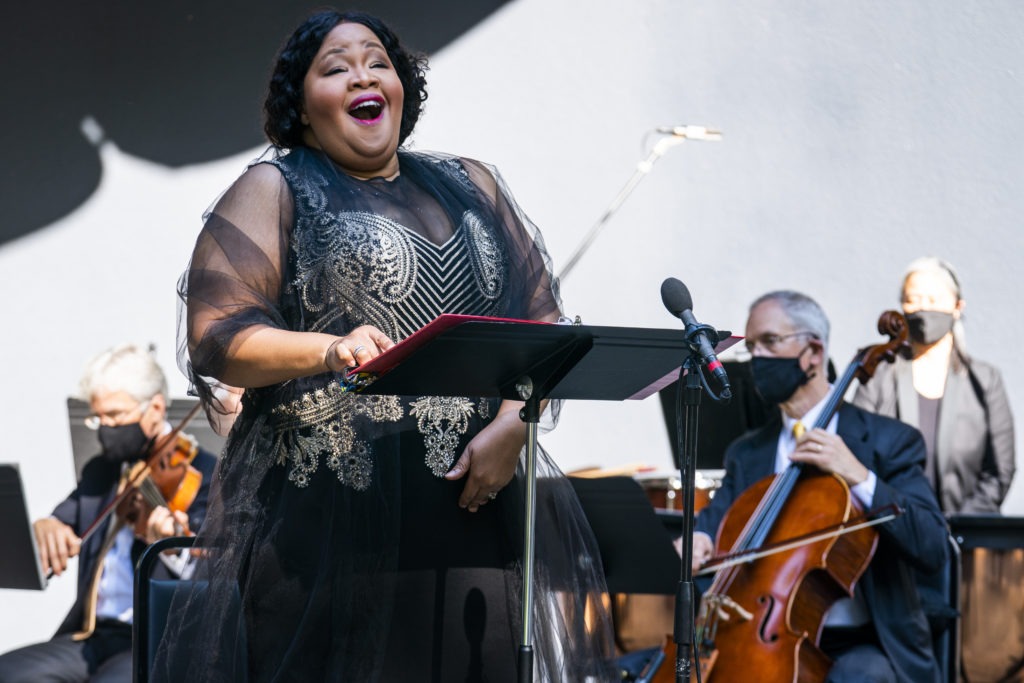Live on the Internet:
Orpheus Chamber Orchestra performs Beethoven’s Egmont
Initially, one may ponder if Ludwig van Beethoven’s 250th birthday really needs to be celebrated with performances offered in his memory. Does extra attention need paid to a composer who is canonized every year, throughout the world, in various genres? Should programming instead attempt to draw relevant parallels to current events in hopes of providing some insight and reflection about modern conflicts? Fortunately for us, the Orpheus Chamber Orchestra has managed to do both with their most-recent production of Egmont, Op. 84.
Johann Wolfgang von Goethe’s 1788 play, Egmont, has been adapted by Franz Grillparzer, with an English translation and further adaptions made by Philip Boehm for this production. Action centers around Count Egmont’s martyrdom in protest of the occupying forces under the command of the Spanish invader, the Duke of Alba. Championing the ideals of liberty and justice, Egmont’s death is celebrated as a victory against oppression. Beethoven composed a series of incidental music movements between October 1809 – June 1810 to enhance Goethe’s text. This music was written shortly after Beethoven had completed his Fifth Symphony – a time when both the Napoleonic Wars and Beethoven’s political views were raging.
…a time when both the Napoleonic Wars and Beethoven’s political views were raging.
It may seem puzzling for a revolutionary like Beethoven to collaborate with a courtier like Goethe. Perhaps, but despite their different sociopolitical leanings, there remained a mutual respect amongst the two creative geniuses for each other’s work – an impressive siloed restraint of bipartisanship. Equally impressive is the recent performance of this work by the Orpheus Chamber Orchestra. Filmed on October 1 at the Beechwood Park Bandshell in Hillsdale, New Jersey, the performance is available for viewing from October 17-22 via the Idagio platform online.
The musicians were seated with a degree of social distancing between every performer. String and percussion forces remained masked the entire performance, whereas woodwind and brass musicians did not use masks or any form of instrument coverings. Narrator, Liev Schreiber, and vocal soloist, Karen Slack, removed their masks just before their respective first contribution to the performance, never again using facial coverings for the remainder of the work.
The Orpheus Chamber Orchestra programmed Tarkmann’s arrangement of Egmont. This setting uses reduced orchestral forces, specifically a single flute – doubling on piccolo, oboe, clarinet, bassoon, horn, trumpet, and one percussionist, in addition to the expected string consort compliment. While effective, some density of the original composition is lost with omitted octaves in lieu of a more transparent harmonic texture.

Liev Schreiber’s enchanting vocal cadence effectively captures focus from the beginning. The varied use of inflection and pacing successfully helps to navigate one through a complex network of emotion. Schreiber’s opening dialogue delivers a hauntingly familiar sentiment for those frustrated with the current political climate, offering the belief that, “. . . but in their hearts, they are yearning for the past.” This desire for a more ideal time is obstructed by our antagonist, the Duke of Alba, who’s objective is to, “quash dissent.” Yet another familiar political tweeting muse. The exchange between the musicians and the narrator has been finely tuned and proves to be a welcomed retreat from the noise of other interrupting facets of modern life.
Not to be forgotten is Karen Slack. Ms. Slack is a seasoned performer whose stage presence and vocal command is inspiring. The two vocal movements, “Die Trommel gerühret” and “Freudvoll und leidvoll,” leave one wishing that this work included additional movements that would feature her voice. Slack currently has a busy artistic season scheduled, of which a world premiere by Adolphus Halistork is rather intriguing. Aspiring to achieve such truth through performance as Slack does, makes ‘being a Karen’ no longer a pejorative.

The third incidental music setting, “Entracte: Andante,” was highlighted by Eric Reed’s horn playing. The agility used to reach the highest of registers proved to be impressively controlled. Leading into the sixth setting, Goethe offers that, “What words can’t tell, music will convey.” James Austin Smith’s oboe playing then certainly requires multiple volumes. The cantabile quality achieved by Smith throughout “Entracte: Allegro-Marcia” was paired with a clarity of articulation and a convincing ability to prepare cadential moments that, in turn, felt inevitable. Maya Gunji’s timpani playing further enhanced the performance later in this same movement, contributing an assured and unyielding depiction of the passing time.
Gunji’s playing later gives way to the lyrical ‘mezza voce’ mourning of clarinetist Alan Kay in the next setting, “Entracte: Poco sostenuto e risoluto.” Kay’s moving contribution is a deployment exquisitely supported by Gina Cuffari on bassoon. Elizabeth Mann’s flute playing enhances the penultimate movement, “Melodram: ‘Süßer Schlaf,’ before Louis Hanzlik’s trumpet playing courageously heralds “Siegessymphonie: Allegro con brio” and encourages the ensemble to energetically reach the conclusion.
Various camera angles and musically driven editing keeps one’s interest while still maintaining focus on the composition. Some ambient noises can be heard, and, on a few occasions, camera angles include a parking lot in the background of some shots. While the two aforementioned realities are noticeable, I would stop well short of suggesting that they are distracting. I have yet to attend a live concert where the unspoken compromise of undesired audience participation – coughing, dropped programs, loud whispering, et. al – is not willingly waged for the chance to experience the magic inherent with live performance. I would suggest ‘going all in’ to view this production.
With recent notices signaling the cancellation of seasons by the Metropolitan Opera, New York Philharmonic, and Broadway, the Orpheus Chamber Orchestra should be commended for its willingness to adapt and find flexible solutions to continue safely creating art. This performance of Beethoven’s Egmont, Op. 84, feels to exist in the vernacular of society’s current struggle to define its desired trajectory of morality. Our desire to define our North Star, be it rising stock markets, law and order, an empathetic awareness that we can only be as strong as our weakest member, or a combination thereof, has been brilliantly mirrored through this performance.



